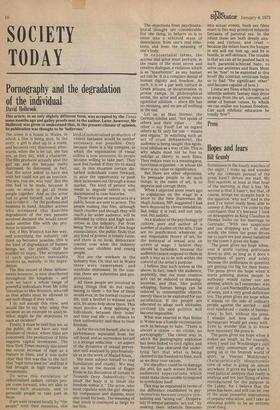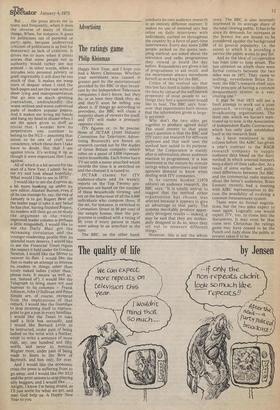Press
Hopes and fears
Bill Grundy
Sometimes in the lonely watches of the night, I wake up and wonder why my constant perusal of the press hasn't driven me mad. My first reaction, at least at that hour of the morning, is that it has. My second is that it hasn't, but that, of course, brings me straight back to the question 'why not?' And in the past I've never really been able to answer it. But now I've come to the conclusion that it's because I look on newspapers as King Claudius in Hamlet looks on his marriage to Gertrude: "With one auspicious and one dropping eye." In other words, the times the press drives me to tears are just about balanced by the times it gives me hope.
The press gives me hope whenever it starts cutting politicians down to size, as long as it does it regardless of party and solely because the politicians in question are getting too big for their boots. The press gives me hope when it starts printing stories people in authority would rather not see printed, which, as I remember, was one of Lord Northcliffe's definition of news, and a very good definition too. The press gives me hope when it stands on the side of ordinary people against the serried — and ever reinforced — ranks of bureaucracy. In fact, without the press, I wonder just how much the bureaucrats would get away with. Even to wonder that is to know how necessary the press is.
The press gives me hope when it makes me laugh, as for example, when I read Ian Wooldridge's cool and witty assessment of what is going on in the feverish world of sport, or Vincent Mulchrone's characteristically idiosyncratic view of what is going on almost anywhere. It gives me hope when I read political analysis that really is analysis and not just flying of kites manufactured for the purpose in the Lobby, for I believe that the press has been, and still can be, one of the most powerful instruments of popular education, and I take an educated public to be an entirely good thing. But . . . the press drives me to tears, and frequently, when it does the obverse of many of those things. When, for instance, it guns for politicians out of personal or party spite, because undeserved criticism of politicians is as bad for democracy as lack of criticism. It drives me to tears when it prints stories that some people not in authority would rather see not printed — in other words, when it intrudes into personal privacy or grief; regrettably it still does far too much of that. It makes me weep tears of despair when I read the back pages and see the vast acres of sheer lying and misrepresentation that go into so much sporting journalism, undoubtedly the worst-written and worst-conceived parts of modern popular papers. And it makes me wring my hands and hang my head in shame when I see the space given to stuff so trivial that I wonder how its perpetrators can continue to belong to the NUJ — assuming that union to be one of craft and conscience, which these days I take leave to doubt. Not that I am against trivia. It's writing it up as though it were important that I am against.
All of which is a bit severe for the start of a New Year, I admit. So let me try and look ahead hopefully. What would I like to see in 1975?
I would like to see the Express do a bit more buoking up under its new editor, Alastair Burnet, even if all he can manage by, say, the end of January is to get Rupert Bear off the leader page (I take it any belief he has that, having finished Rupert, its readers will then go on to study the argument in the vastly improved leader column is perhaps a little misguided). 1 would like to see the Daily Mail get the increasing circulation and the younger-readership profile that its splendid team deserve. I would like to see the Financial Times regain the respect it held under Sir Gordon Newton. I would like the Mirror to recover its flair. I would like the Sun to make an attempt to interest its readers in things other than lovely naked ladies ('other than,' please note. It means 'as well as,' not 'instead of). I would like the Telegraph to bring more wit and humour to its columns — Frank Johnson, John O'Sullivan and Peter Simple are, of course, excepted from the implications of that remark. I would like the Guardian to stop straining itself to rupturepoint to get a pun in every headline. I would like the Times to take itself a little less seriously, and I would like Bernard Levin to be instructed, under pain of being lashed on the wrist with a feather, never to write a sentence of more than, say, one hundred and fifty words, and never to mention Wagner more, under pain Of being made to listen to the Bore of Bayreuth, and him only, for ever.
And I would like the economic crisis the press is suffering from to go away, and I would like the NUJ and,the print unions to stop playing silly beggars, and I would like • Alright, I know I'm being stupid, so I'll just settle for what we get, and may God help us. A Happy New Year to you.



























 Previous page
Previous page